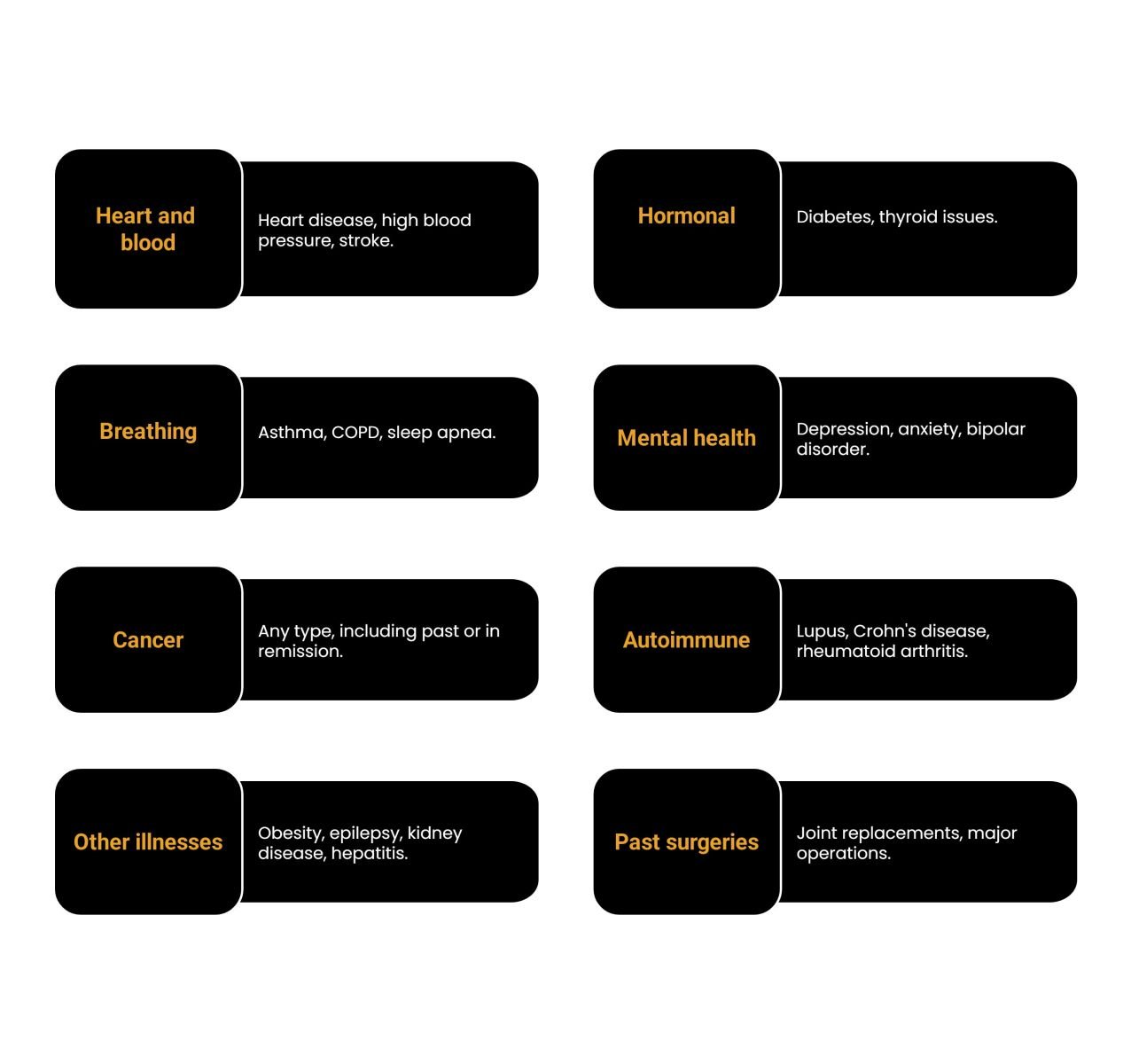Pre-existing conditions? These expat insurance plans still have you covered
It’s important to understand what a pre-existing condition is and how different insurance options work

Many expats feel worried that their pre-existing health problems will stop them from getting insurance in a new country. This fear is common, especially when medical care can be expensive. But the good news is, some insurance, like the plans you can get from Cigna, understand such anxieties and offer plans that may still cover those conditions. These plans give you more freedom and help you feel safe, even if you’ve had health issues in the past. That way, you can enjoy your new life abroad without always worrying about your health.
On this page
| Jump to section | Description |
|---|---|
| What is a pre-existing condition? | A pre-existing condition is any health problem you had before your insurance plan started, including illnesses or injuries that were diagnosed or treated previously. |
| Why insurance plans often don’t cover pre-existing conditions at first | Insurers exclude pre-existing conditions initially to manage risk and avoid large claims right after policy sign-up, which helps keep premiums affordable. |
| How expat insurance covers pre-existing conditions | Expat insurance may cover pre-existing conditions after a waiting period or with higher premiums. Some plans might offer limited coverage or additional conditions based on your health history. |
| What to look for in an expat health insurance plan | Look for clear coverage on pre-existing conditions, flexible options for added services, and access to a wide network of private hospitals. Ensure the plan suits your needs and provides long-term care. |
| Why Cigna is a trusted choice for expats | Cigna offers flexible plans, a vast network of hospitals, and experienced support to meet expat needs, especially those with pre-existing conditions. |
What is a pre-existing condition?

A pre-existing condition is any health problem you had before your new health insurance plan started. This includes illnesses, injuries, or medical issues that were diagnosed or treated in the past. Health insurance companies use this term to describe anything that existed before your coverage began, even if it happened a long time ago.
How do insurers define it?
A pre-existing condition is something you or your doctor already knew about before you signed up for a new plan. It can be a serious illness, a long-term issue, or something that comes and goes. If you got advice, treatment, or medicine for it before your insurance started, it usually counts. Insurers may also look at your medical history going back several months or even years to check for these conditions.
Quick overview of common types of pre-existing conditions

Note: This list isn’t complete. If you’ve had treatment, advice, or a diagnosis before, it might count as pre-existing.
What to remember
- A pre-existing condition is a health problem you had before your insurance started.
- Most insurers ask you to share this information.
- These conditions may affect your coverage, so it’s important to check before choosing a plan.
- Plans like those from Cigna can help cover some pre-existing conditions, depending on your needs and history.
Why insurance plans often don’t cover pre-existing conditions at first

When expats look for health insurance, they often find that pre-existing conditions are not covered right away. This is a common rule in the insurance world. It’s mainly done to manage risk, avoid big surprise claims, and keep the plans affordable.
Why do insurers exclude pre-existing conditions?
Higher risk of future claims
If you already have a health problem, there’s a higher chance you’ll need treatment again. That makes it more expensive for the insurance company. They want to share risk across many people, and covering known conditions makes it harder to do that fairly.
Avoiding big costs right after sign-up
If insurance covered all health problems from the start, some people might wait until they got sick to buy a plan. This is called adverse selection. It leads to large bills for the insurer, often before the person has paid much into the plan.
Simple plans need protection
Some insurance plans skip deep medical checks to make it faster and easier to sign up. These plans are called moratorium or simplified plans. Because the insurer knows less about your health, they often exclude past conditions to stay financially safe.
How expat insurance covers pre-existing conditions

Health insurance companies for expats use different ways to offer coverage for pre-existing conditions. Their goal is to protect your health while managing their financial risk.
Full coverage after a waiting period
Many insurance plans will cover your pre-existing condition after a waiting period, usually 12 to 24 months. During this time, you won’t be able to make claims for that condition. But if you don’t need treatment during the waiting period, coverage may start once it ends. This helps the insurer manage costs while still giving you future support.
Higher premium or limited coverage
Some insurers allow coverage for pre-existing conditions but charge a higher price; this is called premium loading. They might also cover only certain parts of the condition, limit how much they’ll pay, or exclude specific treatments. This depends on your health history and how serious the condition is.
Medical history checks
Many plans ask you to share your full medical history before they accept you. This process is called medical underwriting. Based on what you share, the insurer decides if they’ll cover your condition, if a waiting period is needed, or if the premium needs to be higher. It’s very important to tell the truth—hiding any health problems can cancel your policy later.
Cigna’s flexible plans
Cigna is known for offering expat health plans that look at your medical background carefully. They may still cover your pre-existing condition, using options like a waiting period or a slightly higher cost. Their flexible plans are a strong choice for expats who need coverage for ongoing or chronic health issues.
If you have a pre-existing condition, don’t assume you’re out of options. Many expat insurance plans, including those from Cigna, can still offer protection. A good broker can help you understand your choices and find a plan that fits your health needs and travel lifestyle.
What to look for in an expat health insurance plan

Choosing the right health insurance is important when living abroad. It protects both your health and your wallet. Here are the main things to look for:
Clear rules about pre-existing conditions
Make sure the plan clearly explains what counts as a pre-existing condition. It should tell you what is covered, what is not, and if you need to share any health history. This helps you avoid problems when making a claim later.
Coverage after a waiting period
Some plans may cover your pre-existing condition, but only after a waiting time—usually 12 to 24 months. Check if the plan offers this and how long you need to wait. This can be useful if you have a long-term health issue but still want affordable insurance.
Flexible options to match your needs
Look for plans that let you add or remove services like doctor visits, dental care, eye care, maternity, or help with chronic illnesses. This way, you only pay for what you really need and get the right care for your health.
Access to private hospitals worldwide
As an expat, it’s important to get good care wherever you are. A good plan should include private hospitals and specialists in many countries. Some plans also offer direct billing, so you don’t need to pay upfront and wait for reimbursement.
If you live in Thailand or nearby, choose a plan with strong local support. Having access to good local hospitals and customer service in your area can make a big difference in your healthcare experience.
Why Cigna is a trusted choice for expats

Cigna, under different names, has been providing health insurance for nearly 230 years and supports over 180 million people in more than 200 countries. With so much experience, Cigna knows what expats need, especially those with pre-existing conditions.
Health plans that fit your real needs
Cigna doesn’t believe in one-size-fits-all plans. When you apply, they ask about your full medical history. If you’ve had past illnesses or ongoing treatments, they look at your situation carefully and explain what’s covered, what isn’t, and if you’ll need to wait before some conditions are included.
- Be open about your health: You’re encouraged to share any health problems you’ve had before.
- They review and explain: Cigna will go over your details and tell you clearly what your plan includes.
- Flexible options: Depending on your health, they may offer coverage with a waiting period, a slightly higher premium, or some limits.
Access to care worldwide
Cigna’s network includes around 1.7 million hospitals, clinics, and doctors across the globe. Whether you’re in your new home country or travelling, you can find care nearby. Their team can help you book appointments, answer questions, and make sure claims are processed smoothly.
Good service and real support
Expats often say they feel well taken care of with Cigna. The company is known for quick replies, helpful staff, and support that makes managing health abroad much easier. You can speak to someone who understands your situation and helps guide you.
Cigna stands out because of its experience, honest approach to pre-existing conditions, flexible coverage, and strong hospital network. Whether your health is simple or more complex, Cigna offers peace of mind so you can focus on your life abroad—not your medical bills.
Many expats worry that their pre-existing conditions will stop them from getting health insurance, but companies like Cigna offer flexible plans that may still provide coverage. These plans often include waiting periods, higher premiums, or limited coverage depending on your health history.
It’s important to understand what a pre-existing condition is, why some plans don’t cover it right away, and how different insurance options work. When choosing a plan, look for clear rules, flexible benefits, and access to private hospitals around the world. Cigna is a trusted choice for many expats because of its strong network and helpful support. To learn more about saving money on healthcare, check out our guide on how to reduce out-of-pocket medical expenses in Thailand.
Sponsored
Latest Thailand News
Follow The Thaiger on Google News:
























